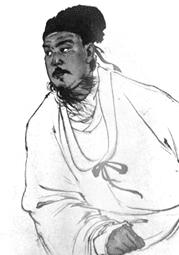Guan Hanqing
Guan Hanqing, known as China's Shakespeare of the Yuan Dynasty (1271-1368), was a leading dramatist who worked out of the capital Dadu (present-day Beijing), but little biographical data on him exists though some documents recorded him as a doctor. A playwright of the Northern Drama, he is credited with more than 64 plays, of which some 15 have survived complete. His most famous work is Dou E Yuan (Injustice to Dou E). Apart from his literary career, he was also said to have been a theatrical manager and sometime an actor.

Guan Hanqing led a dissolute life, spending much time in places of low entertainment, yet he emerged as perhaps China's greatest playwright. Acknowledging his bohemian lifestyle, he called himself "the leader of all loafers in the country", and described himself as a "copper pea that cannot be crushed".
Dou E Yuan is based on a Han dynasty folk tale, A Filial Woman of Donghai. Guan Hanqing used the story as a framework for criticism of the evils of contemporary society. In her childhood, Dou E was sold to the Cai family to be brought up to marry their son. Soon after they married, her husband died. Dou E and her mother-in-law, who had also become widowed, were dependent on each other for survival. Zhang Lu'er, a local hoodlum, pressured the pair to marry him and his father, respectively. When the two women spurned his offer, Zhang Lu'er tried to poison Dou E's mother-in-law, but killed his own father by mistake. Zhang put the blame on Dou E. The muddle-headed local prefect had Dou E flogged.Dou E had no choice but confessed to the murder, then Dou E was finally executed, and Zhang Lu'er got off scot-free. Facing death, Dou E cried out, "The lives of the poor, though virtuous, are short, while the evil enjoy prosperous and long lives. It is unjust. Even Heaven and Earth bully the weak and fear the strong! The earth cannot tell the good from the evil, and Heaven has wronged an innocent person." Dou E's words expressed Guan Hanqing's noble spirit of not yielding to his own hard destiny.
Most Yuan Zaju give voice to the repressed and indignant feelings -- a natural outcome of the fact that the playwrights were fully aware of the dark side of the society they lived in.
Editor: Feng Hui
|

